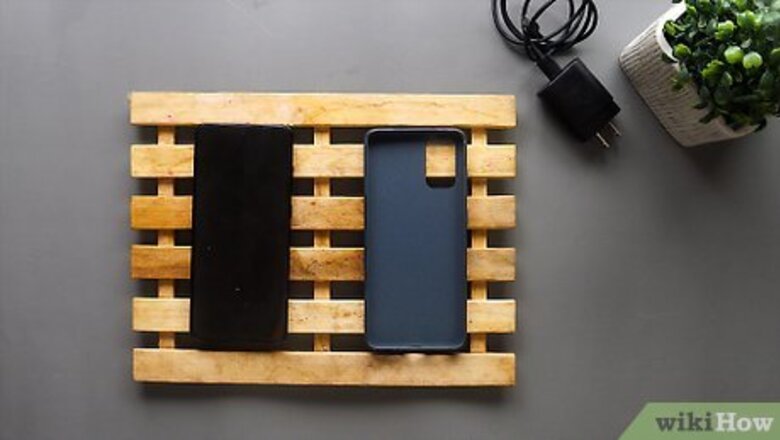
views
Using Soap and Water
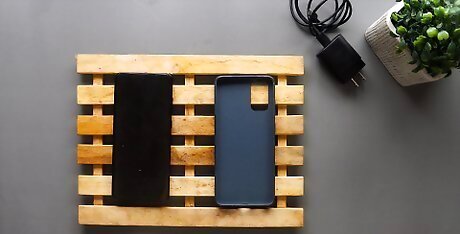
Take your phone out of the case. Never attempt to clean your phone case with your phone inside of it, as liquids may damage your phone. Set your phone aside somewhere it won’t get wet. If your phone case has both a plastic and silicon component, separate the two parts. Pull the flexible silicon piece out of the hard plastic piece that's on the outside of the case.
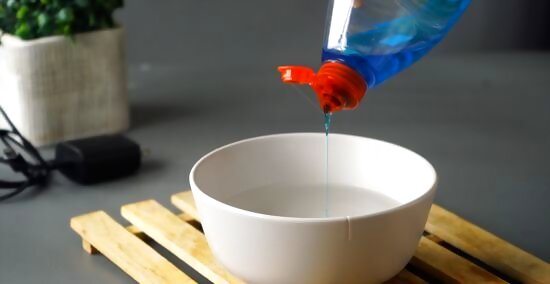
Mix 1 cup (240 mL) of warm water and a drop of soap in a bowl. As long as you're cleaning plastic, silicone, or rubber, dish soap is your best option. Just don't use more than 1 drop of dish soap, as too much soap will make your mixture overly sudsy. If you don't have dish soap, try laundry detergent, a liquid castile soap (like Dr. Bronner's), or hand soap. Stir the soap and water with a spoon thoroughly. If you're cleaning a leather phone case, use a drop of natural baby soap or gentle hand soap instead. If you don't have a gentle soap, mix water and vinegar—one part vinegar, two parts water. If your phone case is made from real wood, avoid using soap at all. Just use plain water or wood cleaner. If using wood cleaner, dab or spray it onto a microfiber cloth. Avoid using window cleaners, solvents, cleaners containing ammonia or hydrogen peroxide, or abrasives on all case materials.
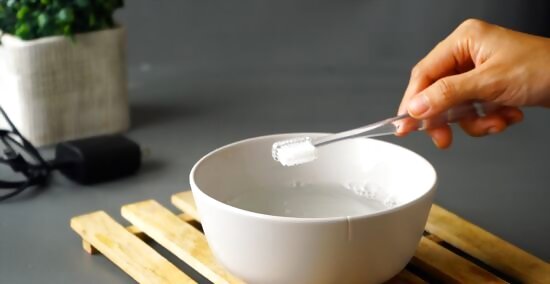
Dip a sponge, cloth, or soft-bristled toothbrush into the solution. Only use a toothbrush when cleaning a plastic, silicone, or rubber case—avoid using one on wood or leather. If using a toothbrush, you'll want to roll it around in the solution to ensure the bristles get sufficiently wet. No matter the material of your phone case, you can also use a rag or sponge instead of a toothbrush. If cleaning leather or wood, wring the rag out as much as possible before applying it to the phone case.
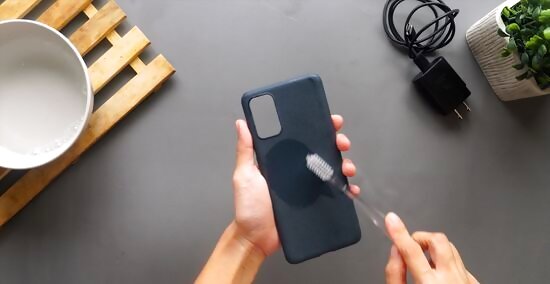
Scrub the surface of the phone case with the toothbrush or cloth. Scrub in a back and forth or circular motion, and go over all the hard-to-reach nooks and crannies on the case. Make sure you're cleaning the outside and the inside of the case. Avoid scrubbing vigorously, especially on leather cases—if there is paint or dye in the material, a tough scrubbing can remove the color.
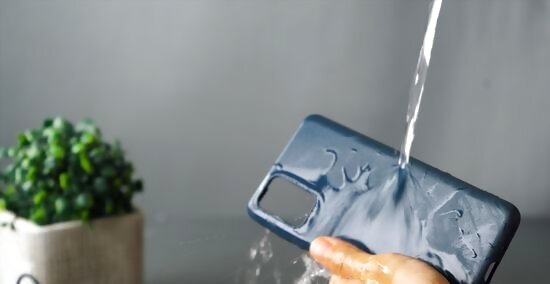
Rinse the case off and wipe it dry with a soft cloth. Make sure all the soapy water or cleaning solution is rinsed off the case before you dry it. Use a soft, microfiber cloth to dry the case so the case doesn’t get scratched up. If you have an eyeglass-cleaning cloth or one meant for electronics screens, that will work wonderfully on all surfaces.
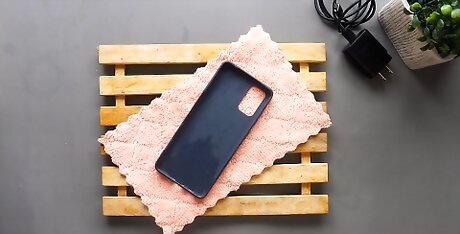
Let the case air dry. Don’t put the case back onto your phone until it's completely dry. This can take an hour or more, but usually not less. Even if your case feels dry, there could still be water on it that could damage your phone. After an hour, you can put your phone back in its clean case. Clean the phone case with soap and water whenever it looks dirty or you notice stains on it.
Disinfecting
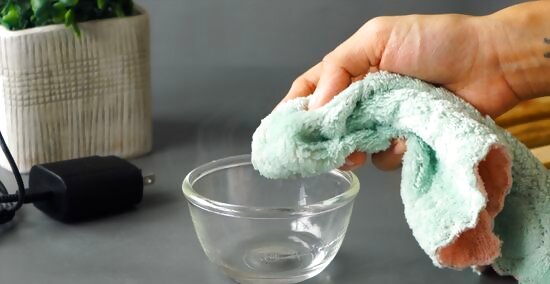
Soak part of a soft cloth in rubbing alcohol. Use rubbing alcohol or an alcohol-based sanitizer that's at least 70 percent alcohol. The best type of cloth to use is one made from microfiber, which is a lint-free material. Any screen-cleaning or eyeglass cloth will work. If you have alcohol pads, such as the ones used on skin before doctors give injections, those are fine as well. If the rubbing alcohol you’re using is in a spray bottle, spray it onto the cloth rather than the case. Alcohol can discolor leather over time, but as long as you use a small amount (don't saturate the cloth!) you usually won't notice a change.
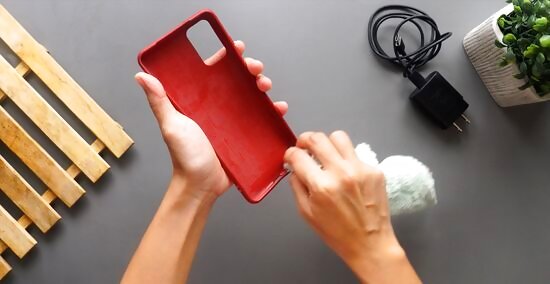
Wipe the phone case down with the alcohol-soaked cloth. Wipe down all parts of the case, inside and out. Wipe gently to avoid damaging the surface.
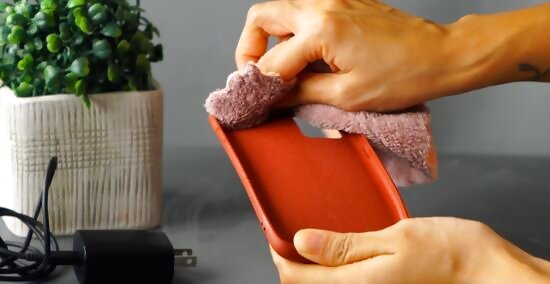
Wipe off the rubbing alcohol with a dry, soft cloth. Rubbing alcohol dries quickly, so as long as you didn't saturate your cloth, you shouldn't have to wipe much off. The phone case should feel mostly dry to the touch when you’re finished giving it a final wiped-down.
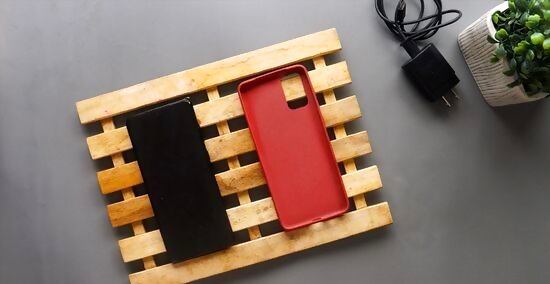
Wait an hour before you put your phone back in the case. Set the case somewhere it can air dry for an hour. After an hour has passed, put your phone back in its case. You can disinfect silicone, rubber, plastic, and wood as often as you'd like. Since alcohol can discolor leather, you can't sanitize it with alcohol as much as other materials. Try to disinfect your case at least once a week, or more often if your phone is often exposed in places where it can become contaminated. If you're using a leather case, consider switching to a case that can easily be cleaned and disinfected, such as silicone, rubber, or plastic.
Removing Silicone and Rubber Stains
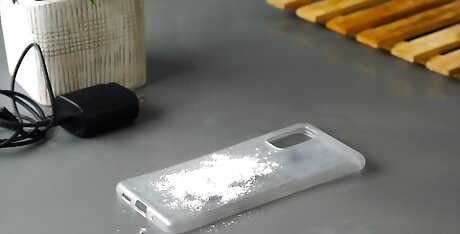
Sprinkle baking soda over the stain on your silicone or rubber phone case. Silicone and rubber can be a bit more challenging to remove dirt and grime from than other materials, so there are a few more steps you to take care of anything that reminds. You don’t need a lot of baking soda, just enough to cover the whole surface of the stain you’re trying to remove. Any kind of baking soda will work. If a stain is actually discoloration, you will not be able to remove it from the case.
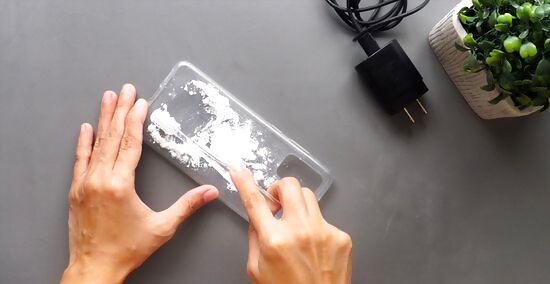
Scrub the baking soda into the stain using a wet toothbrush. Rub the toothbrush back and forth over the stain, until no evidence of the stain remains. You may not be able to remove all stains using baking soda. If you’ve been scrubbing for a while and the stain hasn’t faded, you may need to use a harsher stain remover to lift the stain. Bleach can stain your phone case, so you'll usually want to avoid using it. However, for more difficult stains on clear or white materials, you can add a few drops of bleach to water if baking soda doesn’t work.
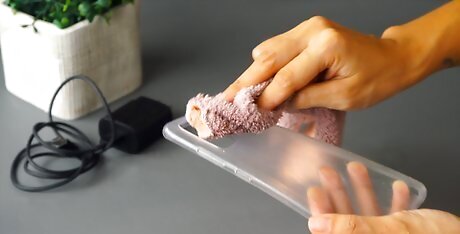
Rinse off the baking soda and dry the phone case with a soft cloth. After you’ve rinsed and wiped down the case, let it air dry for at least an hour. After an hour, you can put your phone back in its case.




















Comments
0 comment